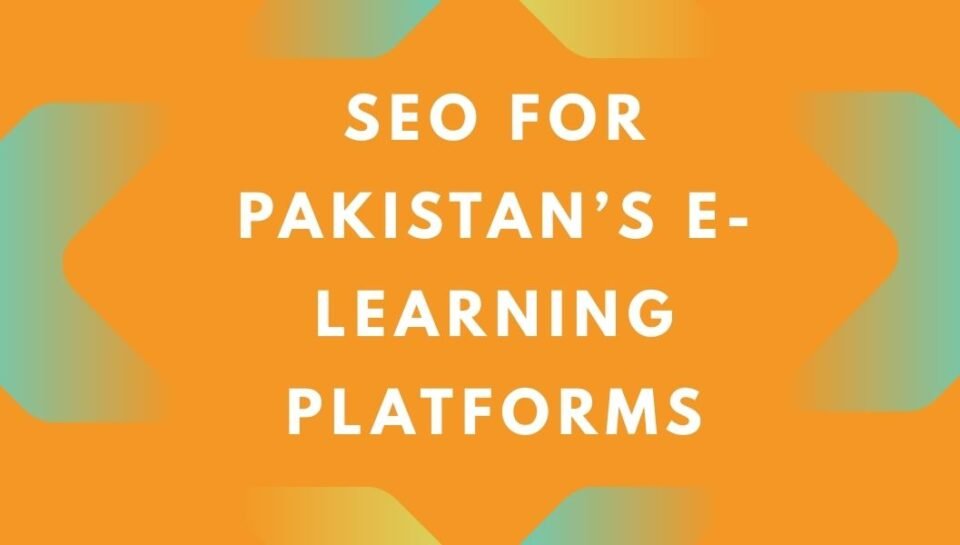
Pakistan’s e-learning market has accelerated, driven by affordable smartphones, cheaper data, and demand for exam prep and skills training. With over 125 million broadband subscribers nationwide (PTA, 2024), students and parents increasingly search online for “best MDCAT coaching online,” “IELTS classes in Karachi,” “CSS past papers,” or “free matric notes Urdu.” Effective SEO ensures your learning platform shows up with the right message at the right moment—lowering acquisition costs, building trust, and converting searchers into active learners.
Why SEO Matters for EdTech in Pakistan
EdTech and online course providers face rising ad costs and seasonal demand spikes. SEO (Search Engine Optimization) gives you compounding, high-intent traffic that you can rely on during peak admissions and exam cycles. It also aligns with Pakistan’s mobile-first reality and multilingual searches (English, Urdu, and Roman Urdu).
- Own the funnel: Capture awareness (guides), consideration (comparisons), and conversion (course pages).
- Reduce CAC: Organic traffic lowers reliance on paid ads, improving LTV:CAC.
- Build credibility: Rankings, reviews, and rich results (FAQ, Course schema) boost trust with parents and learners.
- Scale nationally: Reach Karachi, Lahore, Islamabad, and beyond with local and national keywords.
Know Your Learner and Their Search Intent
Pakistan’s online learning audience is diverse. Mapping personas to intent guides keyword research and content.
Key personas and intents
- Matric/Inter students: “9th class math notes Urdu,” “1st year physics numerical,” “past papers Punjab board.”
- Test prep candidates: “MDCAT online classes fee,” “ECAT syllabus 2025,” “CSS essay preparation course.”
- Language & study abroad: “IELTS online course with mock tests,” “PTE tips in Urdu,” “Duolingo English test practice.”
- University/skills: “data analytics course online Pakistan,” “freelancing course Urdu,” “Python for beginners.”
- Government jobs: “FPSC test preparation online,” “PPSC past papers with answers.”
Language matters: English, Urdu, and Roman Urdu
Searchers mix languages and spellings. Optimize for variants without spawning thin duplicates.
- English: “class 9 biology notes”
- Urdu: “نویں جماعت بایولوجی نوٹس”
- Roman Urdu: “9th class biology notes Urdu medium”
Use on-page synonyms and FAQs to satisfy all variants, and consider hreflang for ur-PK and en-PK where you maintain fully translated pages.
Seasonality and timing
- Board exams: Spikes before and during Matric/Intermediate exams (province-wise cadence).
- Admissions windows: University, medical and engineering entry tests.
- Global test cycles: IELTS/PTE peaks before scholarship and visa deadlines.
Build a Data-Driven Keyword Strategy
Focus on high-intent, Pakistan-specific keywords across the entire funnel. Use Google Keyword Planner, Search Console, Google Trends, YouTube autocomplete, and competitor gap tools.
Pillar and cluster model
- Pillar page: “MDCAT Preparation Online — Complete Guide (2025)”
- Clusters:
- “MDCAT Biology past papers with solutions”
- “MDCAT Chemistry numerical shortcuts”
- “MDCAT fee, scholarships, and discounts”
- “Top MDCAT academies online vs in-person (Karachi/Lahore/Islamabad)”
- “MDCAT mock tests download”
Transactional vs. informational keywords
- Transactional: “buy IELTS online course Pakistan,” “CSS online classes price,” “ECAT live classes enrollment.”
- Informational: “how to prepare IELTS speaking,” “FPSC general knowledge notes PDF,” “9th class physics formulas.”
Local and city modifiers
Add city/location intent where relevant:
- “online tuition for class 10 Karachi,” “IELTS online classes Lahore,” “CSS academy Islamabad online.”
URDU/English mapping without keyword stuffing
Incorporate semantic terms naturally:
- “notes,” “past papers,” “syllabus,” “video lectures,” “quiz,” “assignment,” “scholarship.”
- Urdu equivalents within FAQs or glossary sections to capture variations organically.
Technical SEO for E-Learning Platforms (LMS + Video)
Site speed and Core Web Vitals
- Optimize LCP: Use lightweight hero images (WebP/AVIF), preconnect to CDN, inline critical CSS.
- Reduce JS: Code-split your SPA/LMS, defer non-critical scripts, minimize third-party widgets.
- Image/video best practices: Lazy-load below-the-fold media; use responsive images and compressed thumbnails.
- Edge delivery: Serve via a CDN with HTTP/2 or HTTP/3; enable caching for static assets.
Clean architecture for discoverability
- Logical URLs: /courses/mdcat/biology/lectures/cell-division
- Silo by exam/class/subject; add breadcrumbs and HTML sitemaps.
- Handle parameters (filters like price/duration) with canonical tags and clear indexation rules.
Structured data (schema.org)
- Course: name, provider, description, instructor.
- FAQ and HowTo on guides and course pages.
- BreadcrumbList for better snippets.
- VideoObject for lesson previews and YouTube embeds.
- Organization and AggregateRating where legitimate.
Indexation and content gating
- Allow index of course landing pages, syllabi, sample lectures, and free resources.
- Noindex paywalled lesson detail pages (avoid cloaking; offer a consistent preview for bots and users).
- Use server-side rendering or pre-rendering if you run an SPA to ensure bots see content.
Internationalization and language
- Use hreflang for en-PK and ur-PK where you have complete localized pages.
- Keep URLs in a single language (commonly English) to avoid duplication; translate on-page copy.
Video and LMS considerations
- Submit a video sitemap with key previews and public lectures.
- Add transcripts (English and Urdu) for accessibility and keyword coverage.
- Ensure secure streaming and no mixed-content errors (HTTPS everywhere).
Apps and deep links
- Use Android App Links and Firebase App Indexing to connect search to in-app content.
- Optimize Play Store listing (ASO) with keywords like “MDCAT preparation,” “IELTS Pakistan,” “class 9 notes.”
On-Page Content That Ranks and Converts
High-converting course landing pages
- Clear promise: “Crack MDCAT 2025 with 20 full-length mocks + video solutions.”
- Detailed syllabus: Modules, outcomes, weekly plan; downloadable PDF.
- Instructors with E‑E‑A‑T: photos, credentials, experience, published results.
- Social proof: verified reviews, success stories, student numbers, media mentions.
- Pricing and scholarships: fee breakdown, installments, need-based aid, trial info.
- Strong CTAs: “Start free trial,” “Book a live demo,” “Join WhatsApp for updates.”
SEO copywriting essentials
- Title tags: “IELTS Online Course Pakistan | Live Classes, Mocks, Fee 2025.”
- H1s that mirror intent; H2s for modules, outcomes, FAQs.
- Meta descriptions with benefit + CTA; keep within pixel limits.
- Use semantic terms naturally: “video lectures,” “quiz bank,” “past papers,” “Urdu/English medium.”
Blog and resource hubs
- Past papers library: organized by Board (Punjab, Sindh, KPK, Balochistan), year, and subject.
- Notes and guides: “9th class Physics numericals,” “CSS English essay topics,” “IELTS band 7 speaking tips.”
- Comparison pieces: “IELTS vs PTE for Pakistani students,” “Top MDCAT academies online.”
- Downloadables: checklists, formula sheets, flashcards, course planners.
Internal linking and UX
- Link from notes/past papers to relevant course modules and free trial.
- Add breadcrumbs and related content widgets to reduce pogo-sticking.
- Implement table of contents with jump links for long guides.
Local SEO for Hybrid and City-Focused Academies
Many Pakistani e-learning brands run hybrid models with test centers or in-person support.
- Google Business Profile: choose accurate categories (e.g., Education Center, E-learning Provider), add services, class schedules, and UTM-tagged links.
- Reviews: encourage authentic reviews after milestones (mock test, course completion).
- Location pages: “IELTS Online + Karachi Campus”—embed map, NAP consistency, localized FAQs.
- Citations: update Pakistani directories and edu portals; use consistent phone and WhatsApp click-to-chat.
Off-Page SEO and Digital PR for EdTech
- Scholarship and results pages: journalists often cite them—earn links naturally.
- Academic partnerships: collaborate with college societies; publish co-branded study resources.
- Teacher-led content: guest lectures on Pakistani education blogs and YouTube channels.
- Data stories: “Trends in MDCAT 2025 prep” or “Rural vs urban online learning access”—pitch to local media.
- Communities: Facebook and WhatsApp groups, Reddit r/pakistan, LinkedIn posts for skills courses.
As a Pakistan-based SEO agency, NB Disruptors has seen that offering free, high-quality past papers and notes often earns backlinks from schools and student groups over time.
YouTube and Short-Form Video SEO
YouTube is a top discovery channel for Pakistani learners. Optimize your channel and videos to drive both views and enrollments.
- Keyword-rich titles and descriptions in English + Urdu where appropriate.
- Chapters for long lectures; pinned comments with resource links and UTM parameters.
- Playlists by class/exam/subject; end screens to course landing pages or free trials.
- Thumbnails with clear promises: “Band 7 Speaking,” “ECAT Physics Tricks,” “9th Chemistry in Urdu.”
- Repurpose to Shorts/Reels with captions; link back to the full course.
Measurement: Analytics That Prove ROI
GA4 events and funnels
- Key events: view_item (course page), add_to_cart, begin_checkout, purchase, generate_lead (trial/demo), video_progress (50%), share, login.
- Build funnels: organic landing page → course page → trial → purchase.
- Track cohort retention: week 1 lesson completion correlates with paid conversion.
Search Console essentials
- Monitor impressions/CTR for top queries (Urdu/English variants).
- Fix coverage issues (blocked JS/CSS, redirected sitemaps, canonical conflicts).
- Inspect pages to validate structured data (Course, FAQ, Video).
Business metrics
- LTV:CAC by channel; A/B test pricing and trial length.
- Track scholarship leads separately; attribute conversions to SEO-assisted journeys.
- Measure blended enrollment rate from organic search + YouTube.
Common SEO Pitfalls for E-Learning Sites
- Thin category pages with no unique copy or syllabus detail.
- Duplicate notes across English/Urdu without proper canonical/hreflang.
- Heavy SPAs without SSR, causing poor crawlability.
- Slow video pages due to oversized thumbnails and unoptimized embeds.
- Outdated exam info; no clear update dates or authors (hurts E‑E‑A‑T).
- Intrusive interstitials and popups harming mobile UX and Core Web Vitals.
- Ignoring Roman Urdu and city modifiers that real users search.
Illustrative Examples
Example A: IELTS course funnel
- Top-of-funnel: “IELTS vs PTE for Pakistani students (2025)” guide with Urdu FAQs.
- Middle: “IELTS band 7 speaking tips + downloadable checklist.”
- Bottom: “IELTS Online Course Pakistan — Live mocks, fee, schedule” with instructor bios and success stories.
- YouTube: Shorts for cue card answers linking to a free mock test landing page.
Example B: MDCAT preparation library
- Pillar: “MDCAT 2025 Complete Roadmap.”
- Clusters: past papers (with solutions), chapter-wise notes, live class timetable, scholarships page.
- Technical: Course schema on landing pages; VideoObject on sample lectures; fast LCP.
- Local SEO: Karachi/Lahore campus pages for hybrid centers and WhatsApp CTA.
90-Day SEO Action Plan for a Pakistani E-Learning Platform
Days 1–30: Foundation and Quick Wins
- Audit: crawl the site, fix indexation, duplicate titles, broken links, robots.txt.
- Speed: optimize LCP on top 20 landing pages; compress images (WebP), defer heavy JS.
- Schema: implement Course, FAQ, Breadcrumb, and Video on priority pages.
- Keyword map: assign primary and secondary keywords to each course and resource page.
- Content refresh: update exam-year references (2025), add author bios and last-updated dates.
Days 31–60: Content and Authority
- Publish three pillar guides (e.g., MDCAT, IELTS, CSS) and 12+ cluster posts (notes, past papers, comparisons).
- Create downloadable resources: formula sheets, mock test samples, study planners.
- Launch scholarship/results pages; pitch to local media and edu bloggers.
- YouTube: 2 long-form lectures/week + 4 Shorts; add chapters and Urdu/English captions.
Days 61–90: Conversion and Scale
- A/B test course page CTAs, fee presentation, and trial length; measure impact in GA4.
- Build city landing pages where relevant; optimize Google Business Profile.
- Strengthen internal links from high-traffic notes/past papers to enrollment pages.
- Publish a data story or whitepaper to earn editorial links.
- Evaluate rankings and CTR; expand into Roman Urdu variants and People Also Ask FAQs.
Relevant Keywords and Semantic Terms to Use Naturally
- Primary: SEO for e-learning in Pakistan, EdTech SEO Pakistan, online courses Pakistan, LMS SEO.
- Secondary/LSI: MDCAT online classes, IELTS course Pakistan, CSS preparation online, ECAT notes, past papers, Urdu notes, Roman Urdu.
- Technical: Core Web Vitals, mobile-first indexing, schema markup, Course schema, VideoObject, hreflang, canonical tags, internal linking.
- Business: student acquisition, conversion rate optimization, free trial, scholarships, fee structure, reviews, success stories.
- Local: Karachi, Lahore, Islamabad, Punjab board, Sindh board, KPK, Balochistan.
Conclusion
Winning organic search in Pakistan’s e-learning market requires a blend of localized keyword research, robust technical SEO for LMS and video content, credible course pages, and authority-building via YouTube and digital PR. Prioritize Core Web Vitals, multilingual intent (English/Urdu/Roman Urdu), structured data, and consistent content updates tied to exam calendars. With a disciplined 90-day plan, your platform can improve rankings, cut acquisition costs, and enroll more students nationwide—sustainably.




